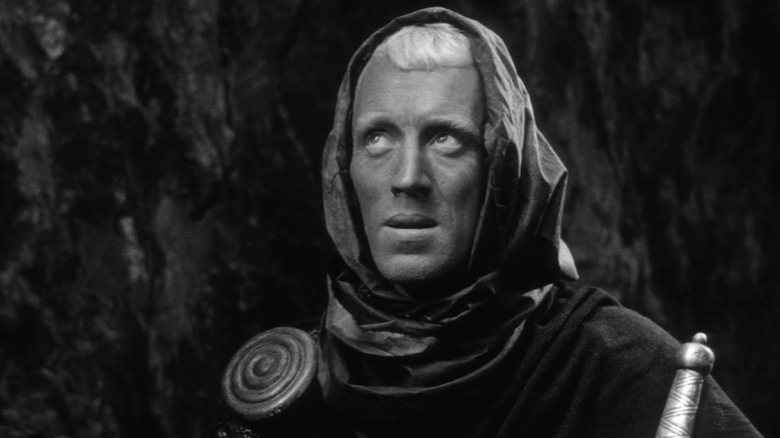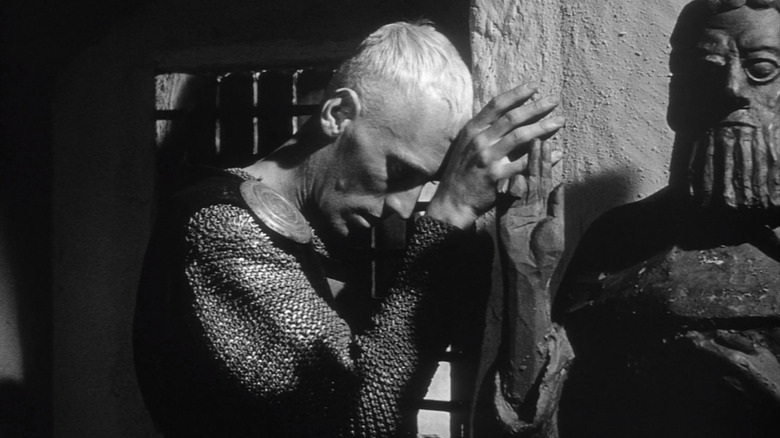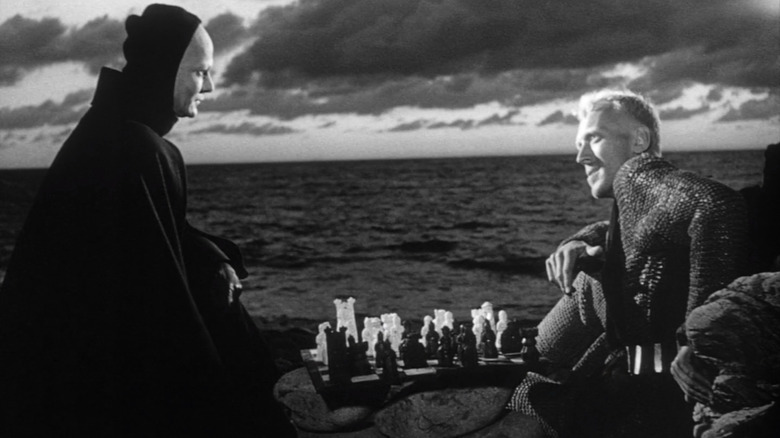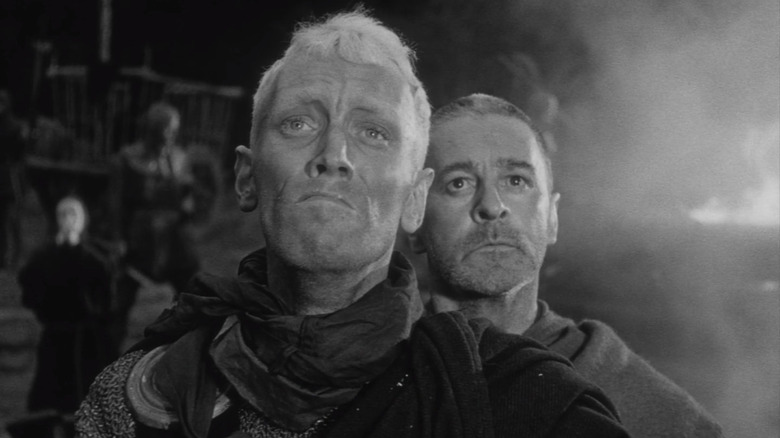Landing The Seventh Seal's Leading Role Felt Like A Demotion For Max Von Sydow
Ingmar Bergman is often considered one of the greatest filmmakers of our time. Bergman began his directing career with moderately successful romantic comedies in the mid-1940s before diving into existential crises ten years later. With films like "Persona," "Wild Strawberries," and "Through A Glass Darkly," Bergman's most popular films explore the complex nature and experiences of humanity by focusing on themes of self-discovery, religious faith, mental illness, and heartbreak. Today, many of his films are considered masterpieces.
One of the director's most celebrated films is "The Seventh Seal." Based on Bergman's 1954 stage play, "Wood Painting," the film is about a Knight (Max von Sydow) who plays a game of chess with Death. During this game, the soldier struggles with religious faith and his own mortality during the time of the Crusades and The Black Death. The play and the movie explore the same themes and include a lot of the same characters, but Bergman had to make one very important change for the film adaptation.
While this is one of Max von Sydow's most famous roles, he didn't jump at the opportunity to star in the film, until his character changed over time.
The Knight's function
In "The Seventh Seal," a Knight and his squire arrive home after a decade of fighting in The Crusades. After encountering Death on an empty beach, the Knight refuses to accept his mortality and challenges the being to a game of chess in a futile attempt to escape his fate. During the game, the Knight encounters a young woman sentenced to death for consorting with the devil, and a poor family of actors. Each of these encounters either heightens or undercuts the Knight's faith in humanity and God.
The entire film is an attempt to understand God's silence and indifference to humanity's suffering. The Knight, who spent the previous ten years of his life fighting on God's side in one of the most barbaric religious wars in human history, fails to understand why God would allow people to endure a deadly disease, or standby idly as a young woman is wrongly accused and burned for being a witch, or refuse to intervene when a young family struggles to find food and shelter.
By the end of the film, the Knight functions as a symbol of humanity's unending suffering and their desperation for a savior who refuses to respond to their agonizing screams. Sydow's Knight could have come off self-righteous or cocky, but the young actor filled every line with a vulnerability and humility that makes God's silence a heartbreaking sound for the soldier and the audience.
Throughout the film, Sydow expresses his vanishing faith and frustrations with God through tense conversations with his Squire and humble church confessionals. These moments allow the audience a revealing peek into the mind of a frightened man facing death, but they only occur in the film adaptation. In Bergman's play, the Knight never says a word, which made Sydow hesitant to play the role.
'He will have his tongue'
The late Sydow is most widely recognized as the title character in the 1973 horror classic, "The Exorcist," but that wasn't the actor's first battle with an omnipotent being. Long before he battled the devil for a little girl's soul, Sydow put his own soul on the line when he challenged Death to a chess match. Sydow's portrayal of The Knight was the start of a long and successful film career, but the actor was initially disappointed when Bergman offered him the role.
In an interview with BFI, Sydow revealed that Bergman originally offered him another role in the film:
"I remember when he first mentioned to me that he wanted me in the film, he didn't ask me to do the Knight. He wanted me to do one of the actors. He said, 'Have you seen the painting of Picasso's with the circus family?' I think it is a very well-known painting, in blue and rose colors, with the man in a Harlequin costume – something like that – and his wife and a little child. And he had some idea of using that, and he wanted me to play this clown, and I was delighted."
At first, Bergman offered Sydow the role of Jof, the patriarch of a struggling family of actors, but the director changed his mind, and asked the young actor to play The Knight instead. Sydow told BFI he was disappointed by the offer:
"I was very discouraged, I remember, because the Knight in the play didn't say a word, because somewhere out during the Crusades somebody had cut out his tongue, so he couldn't speak. So I was very disappointed."
Sydow's disappointment was short-lived because Bergman gave the film version of the Knight his tongue back, and provided him with poetic dialogue.
To speak of pain
Replacing the Knight's tongue did more than secure Bergman's leading man, it made the Knight a more relatable character. Traditionally, characters who suffer in silence were thought to be stronger than those who openly discuss their struggles. While this might work for brooding bad boys in young adult fiction or '90s TV shows, it would have been much less successful in Bergman's film.
"The Seventh Seal" is about humanity's endless search for meaning in times of uncertainty or disaster. The Knight spends the entire film looking for some proof of God, or the afterlife, hoping to escape the fear of death. Of course, the audience would have pitied a tongueless Knight, but they wouldn't have been able to communicate with him or fully understand the depths of his crisis of faith. The Knight's voiced confessions and unanswered questions draw the audience deeper into his fruitless search for a savior, and the increasing pain and confusion of God's silence.



